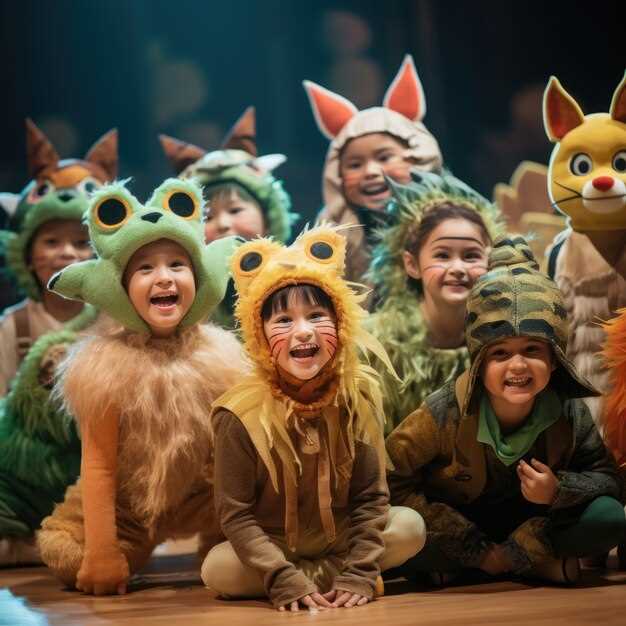Imagination knows no bounds. Engaging young minds in creative pursuits can ignite passions that last a lifetime. Opportunities abound for developing talents in a vibrant, supportive environment. From improvisation to character development, learners can dive into a world where expression meets enjoyment. Each activity nurtures confidence and fosters collaboration.
While exploring various platforms, students can unleash their inner storytellers. These enriching programs cater to diverse interests, combining artistic exploration with social interaction. In a setting brimming with inspiration, participants not only polish their skills, but also create lasting memories and friendships.
Whether it’s through performance art, workshops, or collaborative projects, participants absorb invaluable lessons about teamwork and self-awareness. Every moment spent in this lively atmosphere fosters growth and empowers individuals to shine. Nurturing creativity often leads to unexpected discoveries, which can be incredibly rewarding and fulfilling.
For those seeking unique activities that inspire joy and foster talent, remarkable experiences await. Immersive environments encourage young performers to embrace their individuality. By engaging in playful exercises and artistic endeavors, they cultivate skills that transcend beyond performance, enriching personal development on many levels.
Discover the Best Theatre Summer Camps for Kids and Teens

Engaging in performing arts activities can be a life-changing experience. Participants get to express themselves through various forms of performance. They learn new skills and build confidence. This environment encourages creativity while facilitating friendships. Every program aims to nurture young talents.
Programs tailored to different age groups provide unique opportunities. They focus on acting, directing, and even stage design. Participants often collaborate on projects that culminate in performances.
- Interactive workshops led by experienced professionals.
- Exposure to various acting techniques, including improvisation and script analysis.
- Performances that allow participants to showcase their newfound skills.
- Opportunities to connect with peers who share a passion for the arts.
As young individuals immerse themselves in this world, they not only learn the intricacies of staging plays but also develop essential life skills such as teamwork, communication, and resilience, which can greatly contribute to their personal growth.
- Research various options in your area.
- Consider reviews and feedback from past participants.
- Evaluate the focus areas of each program.
- Look into the qualifications of instructors.
Choosing an enriching experience that fosters both artistic talent and personal development is vital. With so many compelling options available, young performers can embark on a journey filled with adventure and discovery.
Creative Summer Experiences for Young Actors

Engaging in theatrical activities can ignite passion and spark imagination in aspiring performers. Young actors seek opportunities that go beyond traditional learning. These experiences open doors to self-expression and collaboration. Creativity flourishes when they immerse themselves in dynamic environments.
During these vibrant sessions, participants explore various aspects of performance. They delve into character development, improvisation, and scene work. These elements are essential for finding one’s voice.
- Workshops led by industry professionals
- Interactive playwriting sessions
- Collaborative group performances
- Fun and educational games to enhance skills
- Creative movement and dance classes
Every young actor benefits from these diverse activities, as they not only hone their craft but also foster lasting friendships and unforgettable memories, nurturing a supportive community that encourages personal growth and artistic exploration.
- Improvisation: Embrace spontaneity and think on one’s feet.
- Character Study: Dive into the psyche of different roles.
- Script Analysis: Learn how to dissect and understand text.
- Performance Techniques: Master vocal projection and body language.
Ultimately, enriching these experiences nurtures both talent and confidence, equipping young actors with skills that extend beyond the stage into everyday life.
Exploring Different Performance Styles
Performance is a vibrant canvas where imagination meets expression. From movement to voice, artists use diverse techniques to convey emotions and stories. It’s not just about being on stage; it’s about transformation. Each style carries its unique flavor, bringing something special to the audience. Embracing various forms enriches the experience and promotes creativity.
Throughout the journey of performance, participants can delve into genres that captivate their interest. Whether it’s the rhythmic embrace of dance, the intensity of acting, or the nuances of musical theatre, each style offers a distinct pathway for growth and self-discovery. Exploration leads to deeper understanding and appreciation of artistry.
| Performance Style | Description |
|---|---|
| Drama | Focuses on storytelling through dialogue and emotion. |
| Dance | Expresses feelings and narratives through movement and rhythm. |
| Musical Theatre | Combines acting, singing, and dancing for dynamic performances. |
| Improvisation | Encourages spontaneity and creativity without a script. |
| Puppetry | Uses puppets to tell stories, involving skillful movement and voice. |
Exploring these diverse styles not only broadens skills but also nurtures imagination. Engaging with various forms of performance opens new avenues for self-expression and connection with others. Every rehearsal transforms participants, allowing them to step into different roles and perspectives, making the experience both transformative and enriching.
Building Confidence Through Acting
Expressing oneself through performance can transform shy individuals into vibrant personalities. It cultivates self-assurance and trust in one’s abilities. Whether on a stage or in front of a camera, stepping into another role allows for exploration of identity. In such environments, participants often confront their fears and embrace the spotlight. This journey fosters growth and resilience in a safe space.
The process of interpreting characters encourages young performers to explore emotions. They learn to take risks, enhancing both their creativity and problem-solving skills. As they shed their insecurities, breakthroughs occur. Each audition, rehearsal, or performance unravels hidden talents. These experiences collectively shape an empowering narrative, boosting self-esteem.
Engaging in drama activities provides unique opportunities for social interaction. It nurtures collaboration with peers, building team spirit. Working together fosters friendships based on mutual respect and shared experiences. Participants often find they are not alone in their struggles, creating a supportive community. Such connections enhance their comfort in expressing thoughts and ideas without judgment.
Furthermore, receiving constructive feedback helps refine their skills while instilling a growth mindset. Learning to accept praise and critique alike is invaluable. With each performance, a deeper understanding of personal strengths and weaknesses emerges. Over time, these experiences intertwine to forge a resilient sense of self. The confidence gained through acting extends beyond the stage, influencing everyday life.
Collaborative Projects and Group Dynamics
Working together on creative endeavors fosters growth and understanding among participants. Each individual brings unique strengths to the table, resulting in a rich tapestry of ideas. Sharing responsibilities not only enhances teamwork but also cultivates lasting friendships. Social interactions in these settings encourage healthy communication and collaboration.
Project-based experiences ignite passion and motivate individuals to contribute. While brainstorming concepts, voices merge, creating a singular vision. In this vibrant atmosphere, cooperation becomes pivotal. Participants learn to value differing perspectives, which drives innovation and creative problem-solving. This dynamic interplay transforms initial concepts into impressive, collective achievements. Ultimately, the outcome reflects not just the talents of individuals, but the power of unity in creativity.
Group dynamics play a crucial role in shaping personal development. Members discover their roles, whether as leaders or supporters. They engage in constructive feedback, which enhances their skills. Constructive discussions lead to a deeper understanding of artistic expression. Each interaction propels individuals forward, helping them embrace their artistic journeys.
Through collaborative projects, participants experience an enriching process. They learn to navigate challenges, adapt to others’ viewpoints, and find common ground. These experiences are invaluable, equipping them with skills beneficial beyond the creative realm.
Guest Artists and Special Workshops
Inviting seasoned professionals into creative environments can spark inspiration. Exclusive sessions with renowned figures offer unique opportunities. Participants engage, learn, and grow in unexpected ways. These experiences enrich programs and provide diverse perspectives.
Special workshops introduce a variety of techniques and methods. They can focus on everything from acting styles to behind-the-scenes insights. Each session becomes a window into the artistry of the craft. Expert guidance transforms a standard experience into an unforgettable adventure.
Not only do guest artists share their knowledge, but they also interact closely with young talents. This personal engagement helps foster relationships, often leading to mentoring or ongoing support. Participants feel a deeper connection to the artistic community as a result. Such moments create memories that last a lifetime, blending education with authentic experiences in a dynamic atmosphere.
Unique Programs for Aspiring Performers

Young talents can explore a variety of innovative opportunities tailored to nurture their skills. These programs often combine practical experience with creative exploration. Participants engage in workshops, acting exercises, and collaborative projects. Each session aims to ignite passion and foster growth. Networking with industry professionals enhances learning and motivation.
From improvisation techniques to character development, aspiring artists can dive deep into the craft. They gain invaluable insights into stage presence and voice modulation, cultivating confidence that transcends performance itself. Group activities encourage teamwork, allowing each individual to shine while supporting their peers. Additionally, specialized classes may focus on various disciplines such as dance, scriptwriting, or musical performance, offering a well-rounded artistic education. This dynamic blend of experiences prepares participants for future challenges, ensuring they leave with not only skills but also lasting memories.
The Importance of Improv in Training
Spontaneity plays a crucial role in developing artistic expression. Engaging in improvisational activities encourages individuals to think on their feet. It fosters creativity and helps build confidence in performance. Furthermore, it enhances communication skills, allowing participants to connect effortlessly with their audience and peers.
Improv nurtures adaptability; participants learn to embrace the unexpected, transforming challenges into opportunities for growth. It allows them to experiment without fear of failure, thereby unlocking their full potential in a supportive environment. This dynamic experience cultivates resilience and sharpens critical thinking. As a result, individuals become more comfortable navigating uncharted territories, whether on stage or in real life.
Encouraging quick decision-making, improv trains minds to be agile and innovative. Crafting spontaneous narratives sharpens storytelling abilities and enriches character portrayals. In turn, this approach ultimately results in well-rounded performers who can embrace a wide range of artistic endeavors with enthusiasm and readiness.
Connecting with Peers and Making Friends
Engaging with others in a creative environment can lead to lasting friendships. Camp sessions often foster teamwork, encouraging collaboration among participants. Sharing experiences allows young people to bond over common interests. These connections can transform into meaningful relationships outside of the camp setting.
When individuals work together on projects, they learn about one another. Discussions about their thoughts, feelings, and aspirations create a supportive community. Such an atmosphere cultivates trust, making it easier to express oneself without fear of judgment.
Activities designed to break the ice can enhance these interactions. Group exercises focus on communication skills and collaboration. Participants share laughter, learn from each other, and form connections that may last a lifetime. In this setting, young individuals discover their unique strengths while appreciating the talents of others.
As days unfold, memories accumulate, and friendships blossom. Team-building challenges encourage participants to rely on one another, forging stronger ties. In moments of triumph or struggle, they find camaraderie, leading to a profound sense of belonging. Through shared experiences, they not only make friends but develop essential social skills that will serve them well in the future.
Scholarships and Financial Aid Options
Financial support opens doors, allowing budding performers to participate without burden. Many organizations prioritize accessibility to their programs. Scholarships are available to help alleviate costs. Aid options can significantly enhance opportunities for passionate individuals.
Exploring these financial avenues can be crucial. Numerous institutions offer assistance to ensure participation is achievable for all. These programs promote inclusion by catering to diverse backgrounds and needs.
Applicants should be prepared to provide information about their financial situation. Some may even require a brief assessment of artistic skills or aspirations. Each opportunity may have different criteria, so researching is essential.
As funding varies, it’s wise to apply early to maximize chances. Frequent check-ins on deadlines and requirements can make a difference. Personal statements or interviews might also be part of the selection process.
Engaging in performing arts can transform lives, enriching experiences beyond measure. Assistance models allow aspiring performers to focus on their craft rather than financial limitations. Gaining access to these resources encourages a thriving artistic community where everyone can shine.
Video:
RCT Summer Camps
RCT Summer Camps by Riverside Theatre 271 views 10 years ago 2 minutes, 12 seconds
Q&A:
What are the main benefits of sending my child to a theatre summer camp?
Theatre summer camps offer numerous benefits for children and teens, including boosting their confidence, improving their communication skills, and fostering teamwork. These camps provide a creative outlet that encourages self-expression and helps develop critical thinking and problem-solving abilities. Additionally, participants often make new friends and cultivate a sense of belonging within a supportive community. Overall, theatre camps can enhance both personal growth and social skills.
How do I choose the right theatre summer camp for my child?
Choosing the right theatre summer camp involves several considerations. First, think about your child’s age and interests—some camps cater specifically to younger kids while others are designed for teens. Next, look into the camp’s curriculum: does it focus on acting, musical theatre, improvisation, or technical aspects like set design? Additionally, consider the reputation of the camp, the qualifications of the instructors, and the location. It may also be helpful to read reviews from other parents and, if possible, visit the camp for an open house or a tour to get a better sense of the environment.
What types of activities can my child expect at a theatre summer camp?
At theatre summer camps, kids can participate in a wide array of activities that cater to different interests and skill levels. Typical activities include acting workshops, improv games, voice training, dance classes, and script readings. Many camps also offer opportunities for creative writing, costume design, and set construction. Towards the end of the camp session, most programs culminate in a performance where campers can showcase what they’ve learned. This mixture of activities helps keep the experience lively and engaging while encouraging collaboration among campers.
Are theatre summer camps suitable for beginners or only for experienced performers?
Theatre summer camps are generally suitable for participants of all experience levels, including beginners. Many camps are designed to provide a supportive environment where individuals can learn and grow, regardless of their prior experience in theatre. Instructors often tailor their teaching methods to accommodate varying skill levels, ensuring that everyone can participate and benefit from the camp. This inclusivity allows new performers to build a foundation in theatre while also offering challenges to more experienced campers, fostering an atmosphere of growth for everyone.
What should my child bring to a theatre summer camp?
When sending your child to a theatre summer camp, it’s important to ensure they are well-prepared. Common items to bring include comfortable clothing that allows for movement, such as shorts and t-shirts, and appropriate footwear, like sneakers or dance shoes. Some camps may also require specific props or scripts, so check with the camp for any specific instructions. Additionally, pack sunscreen, a water bottle, snacks, and any personal items like notebooks or journals for writing exercises. If the camp includes outdoor activities, a hat or sunglasses can also be beneficial. Being prepared will help enhance your child’s summer camp experience.
